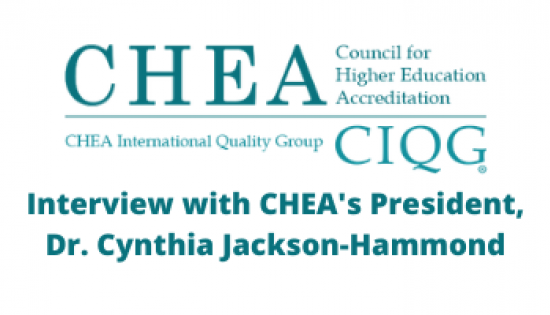Dr. Cynthia Jackson-Hammond was named new President of the Council for Higher Education Accreditation (CHEA) in May 2020. INQAAHE contacted her to formally welcome her to the position and personally meet her.

- Could you introduce yourself and your background and passion that lies for QA and accreditation?
I recently completed my tenure as an academician in higher education culminating with the presidency of an 1890 Land Grant University/Central State University in Wilberforce, Ohio. My career began as a faculty member and throughout my tenure, I served as a director, dean, vice president and provost in various institutions and regions. As a member of the higher education community, quality and accountability have always been important to ensuring public trust. The public believes in higher education and depends on institutions to support standards that will serve the greater good for a productive society. Accreditation provides those assurances at the program and institution levels.
In this ever-changing world, it is more imperative that accreditation organizations and institutions work together to continue promoting and advancing quality in higher education.
- What are the priorities for your presidency/tenure?
Priorities include:
- Refining the Recognition process for accrediting organization to ensure that quality assurances, institutional self-study and public transparency and accountability are sustained.
- Assisting higher education in their continuous assessment of institutional and program self-study.
- Advocating for autonomy in the self-study process for institutional and academic program quality; and
- Serving as information accreditation nexus to government officials, Department of Education and other stakeholders.
- What are the key changes in global developments that would significantly affect quality assurance and accreditation practices? in which ways do you envision the changes to unfold?
It is unfortunate that the world is forced to see everything through the lens of COVID 19 but that is where we are in designing new ways of life. Colleges and universities are facing unparalleled concerns regarding enrollment, mental and physical health of students, faculty and staff, campus safety, sustaining high quality instructional experiences and most prominent is the design of instructional delivery that is appropriate under adverse conditions.
Of course, the political and economic world stage is also in flux. These two determiners greatly affect the culture, values, attitudes and actions of people and often influence how higher education is viewed in the context of so many uncertainties. The development of a vaccine to mitigate the ravage of this insidious virus is the beginning of a shifting paradigm toward hope and normalcy.
Changes will be gradual as we vacillate between what was, what is and what will be. The principles and processes of organizational structures do not change quickly; however, there will be changes over an extended period. I think that any forthcoming changes will be thoughtful, sustainable and aspirational… ensuring that academic integrity and quality continue to thrive.
- How do you see the future of CHEA and CIQG in 5-10 years’ time?
CIQG is an important aspect of connectivity and unifying ideas, thoughts and understandings around quality in higher education. Our global family is fortunate to share common interests in quality assurance for the public good. It is CHEA/CIQG hope that in time that our voices will be as one as we join international communities in higher education with the purpose of increasing the value of higher education through high standards of accountability for public betterment.
- As one of the advanced systems of accreditation, what changes the USA needs to undertake to maintain the relevance? Are there any plans for QA of alternative education?
President Elect Biden has recently identified a new Secretary of the Department of Education. Dr. Miguel Cordona is an experienced advocate for quality education and fair and equal educational experiences for all. He and his team will chart new directions for America’s education systems. No doubt as COVID remains as a part of our lives, alternative education will continue to be studied and scrutinized. Every parent, child, adolescent and college student has and is experiencing alternative teaching and learning. These alternative strategies are going to be ever present even as a post-COVID paradigm.
- What are the plans to be engaged in the global quality assurance and, thus, collaboration with INQAAHE?
CHEA is an organization that believes in global and world view perspectives. Technology has allowed us all to be global citizens and connect with each other on issues that are universal. Education is universal! CHEA and INQAAHE collaborations seem to be a natural point of connectivity as we address opportunities for quality in higher education. Students are now global citizens and as two thoughtful communities, we are “duty” bound to ensure public trust through quality assurances around the world.
- Any additional thoughts that you would like to convey to the global QA community?
The year 2020 has been difficult for all of us. But, in that difficulty, our communities have risen to new consciousness about global inclusiveness. There is strength in valuing and appreciating different perspectives, cultures and ways of thinking and doing. CHEA looks forward to working with our global partners to learn and share common experiences and create new, better and effective opportunities for those who seek quality education! Succinctly put, education is the great equalizer that should not be limited by borders.
Thank you, for the opportunity to share my thoughts and CHEA looks forward to a fruitful relationship with INQAAHE.


